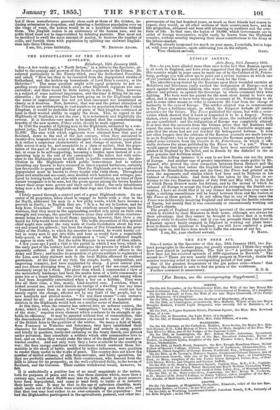RUSSIAN AGENCY.
Arle-Bury, 24th January 1855.
SIR—As you have alluded more than once to the fact that Russian agency is at work in England, and have even suggested that the periodical press of this country might in some cases be made use of by the Cabinet of St. Peters- burg, perhaps you will allow me to point out a recent instance in which one of our journals has done a useful stroke of work for the Czar. The atrocities perpetrated by the Russians upon their wounded enemies at Balaklava and Inkerman justly excited the indignation of Europe—not so much against the private soldiers, who were evidently stimulated by their officers and priests, as against the Sovereign by whose command they were fighting. The facts were too patent for the most stout denial to have any effect, and it seems to have been thought necessary at St. Petersburg to re- sort to some other means in order to exonerate the Czar from the charge of barbarity in the eyes of Europe. The artifice adopted was to communicate to the Times a fictitious ukase, in which the Emperor forbade all similar atrocities for the future. The Times published the ukase, but with a reser- vation which showed that it knew or suspected it to be a forgery. Never- theless, every journal in Europe copied the ukase, the authenticity of which no one questioned ; and the indignation of Europe was completely allayed. It is true that the accounts from the Crimea prove that the Russians still repeat the same horrors at every opportunity; but the charitable might sup- pose that the ukase had not yet reached the beleaguered fortress. It does not often happen that the contents of the Russian Journals are made known to us in England ; but in the present instance the German papers have pub- lished some extracts from the Gazette de St. Petersbourg, in which it offi- cially declares the ukase published by the Times to be A LIE." Thus it would appear that the purposes of the Czar have been successfully accom- plished in England by the !Aid, and in Russia by the disbelief in the at once genuine and fictitious ukase ! From this trifling instance it is easy to see how Russia can use the press of Europe. And another case of greater importance was made public by Mr. Layard, who proved the close connexion between Baron Brunow and the Times by the fact that before the English Cabinet knew what had passed between Sir Hamilton Seymour and the Czar, the Times bad "tinted as its own the arguments and similes which had been used by Nicholas in his Cabinet at Czarsko-Zelo. And from the line taken by the Times in re- ference to the two Russian treaties of July 1840 and May 1852, by the first of which Baron Brunow made his fortune, and by the second of which he induced all Europe to accept the Czar's plans for arranging the Danish suc- cession, I have no doubt that if by any chance his instructions ever come to light, a striking resemblance will be found between them and the leaders of the Times at those periods. I do not affirm that in any of these cases the Times was deliberately deceiving England and advancing the hostile schemes of Russia, but merely that it was consciously or unconsciously working out the Czar's objects. The people of England are so i completely ignorant of the enormous power which is wielded by their Ministers n then name, although not always for their advantage, that they cannot be brought to believe that it is worth Russia's while to deceive them ; and if you can persuade them that there is a Russian agency busily. engaged in England in working out plans bene- ficial to Russia but injurious to England, you will have conferred a great benefit upon us, and have done much to battle the schemes of our foe.


































 Previous page
Previous page